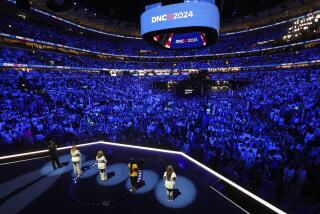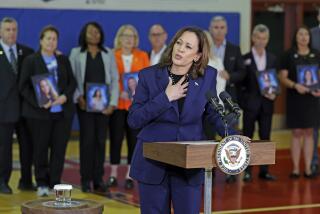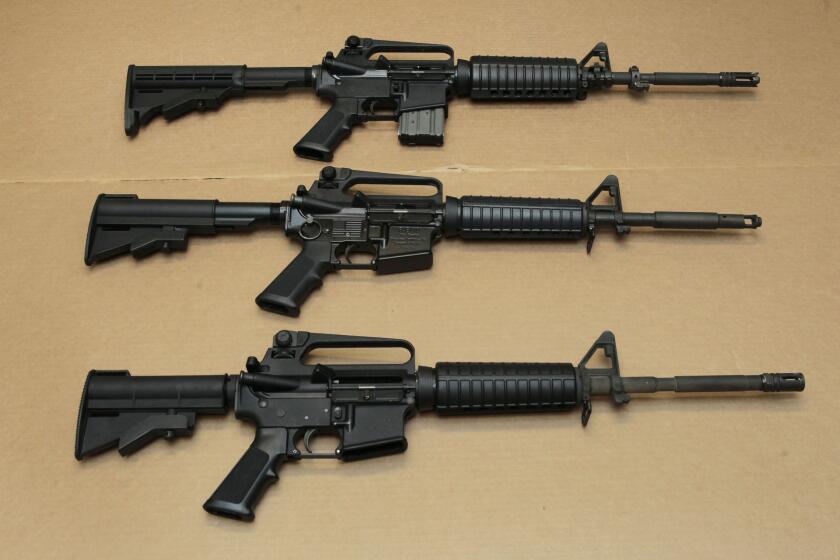Dallas police shootings could create unwelcome tensions for Black Lives Matter movement and its allies
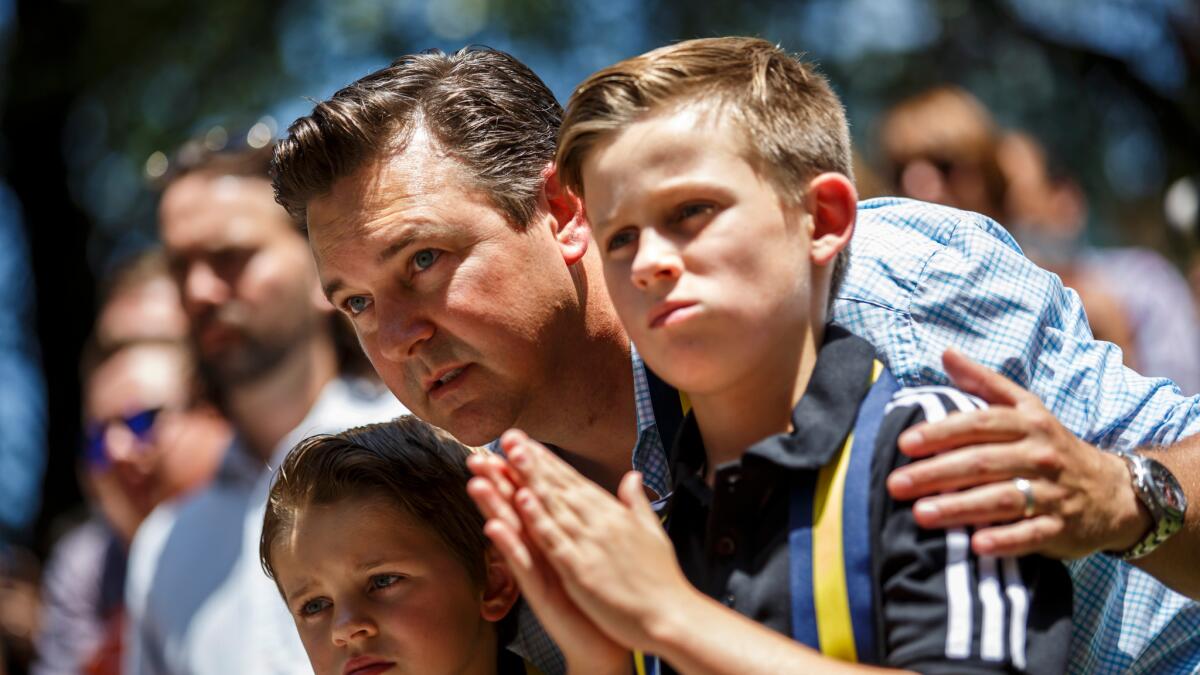
- Share via
Hillary Clinton had been preparing Friday to have the conversation about criminal justice that she has had throughout her campaign, one in which there is no ambiguity about which Americans are under attack. But the shootings in Dallas shifted that conversation.
They left Clinton, an unapologetic ally of Black Lives Matter who condemns racist applications of enforcing the law, tasked with reassuring a nation shocked by the murder of five police officers.
The carnage that unfolded in Dallas, coming as the nation watched in horror as fresh videos emerged of black men being shot to death by police, leaves the dialogue on race and violence in a precarious place. The progress that civil rights advocates made in raising awareness about law enforcement’s disparate treatment of minorities is bumping up against the public’s anxieties over safety.
Both Clinton, the presumptive Democratic presidential nominee, and Black Lives Matter activists found themselves trying to bridge the public outrage they helped build with assurances that their goal is to ultimately strengthen, not undermine, police who are reeling from the worst act of violence against them since the 9/11 attacks 15 years ago.
“I know that just by saying all these things together, I may upset some people,” Clinton said during an address to black church leaders in Philadelphia in which she read out the names of police officers who were killed, as well as blacks killed by police, and renewed her call for criminal justice reforms and more stringent gun control.
“I am talking about criminal justice reform the day after a horrific attack on police officers,” she said. “I am talking about courageous, honorable police officers just a few days after officer involved killings in Louisiana and Minnesota. I am bringing up guns in a country where merely talking about comprehensive background checks and getting assault weapons off our streets gets you demonized. But all these things can be true at once.”
The movement has been and will continue to be about ending violence.
— DeRay McKesson, Black Lives Matter activist in Baltimore
As Clinton praised the heroism of the police officers in Dallas who worked to protect the civilians at the Black Lives Matter protest where an assailant opened fire, she also continued to push Americans to empathize with the anxiety and anger of black Americans.
“White Americans need to do a better job listening when African Americans talk … about the seen and unseen barriers you face every day,” she said. “We need to try as best we can to walk in one another’s shoes, to imagine what it would feel like if people followed us around stores or locked their car doors when we walked past.”
But she also urged the crowd to “put ourselves in the shoes of police officers,” particularly those who ran toward the gunfire as shots rang out in Dallas, as civilians ran for cover.
Clinton’s likely Republican rival, Donald Trump, canceled a campaign stop in Miami and condemned the officers’ killings as “an attack on our country,” saying Friday that racial relations in the U.S. were deteriorating.“We must restore law and order,” he said in a statement. “We must restore the confidence of our people to be safe and secure in their homes and on the street. The senseless, tragic deaths of two motorists in Louisiana and Minnesota reminds us how much more needs to be done.”
Five police officers died and seven officers and two civilians were wounded Thursday night after 25-year-old Micah Xavier Johnson, a former Army reservist, targeted police in downtown Dallas, authorities said. Johnson told police during a standoff that he was angry “with white people” and wanted to kill white officers, according to Dallas police, who said he mentioned the Black Lives Matter movement.
On Friday, Black Lives Matter released a statement distancing itself from Johnson, calling the police deaths “a tragedy” but saying it would not back down from its demands for police reform.
“There are some who would use these events to stifle a movement for change and quicken the demise of a vibrant discourse on the human rights of Black Americans. We should reject all of this,” said the statement.
Police have said that before he was killed in the standoff, Johnson said he was not affiliated with any group. On his Facebook profile, Johnson, who was black, had either liked or joined Black Panther Party-related groups, including one called the Huey P. Newton Gun Club, named for the black power group’s co-founder.
Diamond Reynolds, the Minnesota woman whose viral Facebook video of her dying boyfriend, Philando Castile, after a police shooting spurred national protests, said at a Friday news conference that the Dallas shootings were “bigger than all of us.”
“I want justice for everyone, everyone around the world,” she said. While she cited the police deaths, she also named black Americans who had died in racially tinged encounters such as Trayvon Martin in Florida and Sandra Bland in Texas.
“This thing that happened in Dallas, it was not because” of her boyfriend’s death and her activism, or to this week’s police shooting of 37-year-old Alton Sterling in Baton Rouge, La., she said.
Minnesota Gov. Mark Dayton, who on Thursday had called the police shooting of Castile an example of racism, said Friday that he would not walk back his comments that the shooting would not have happened if Castile and Reynolds were white.
“I stand by what I said yesterday,” he said.
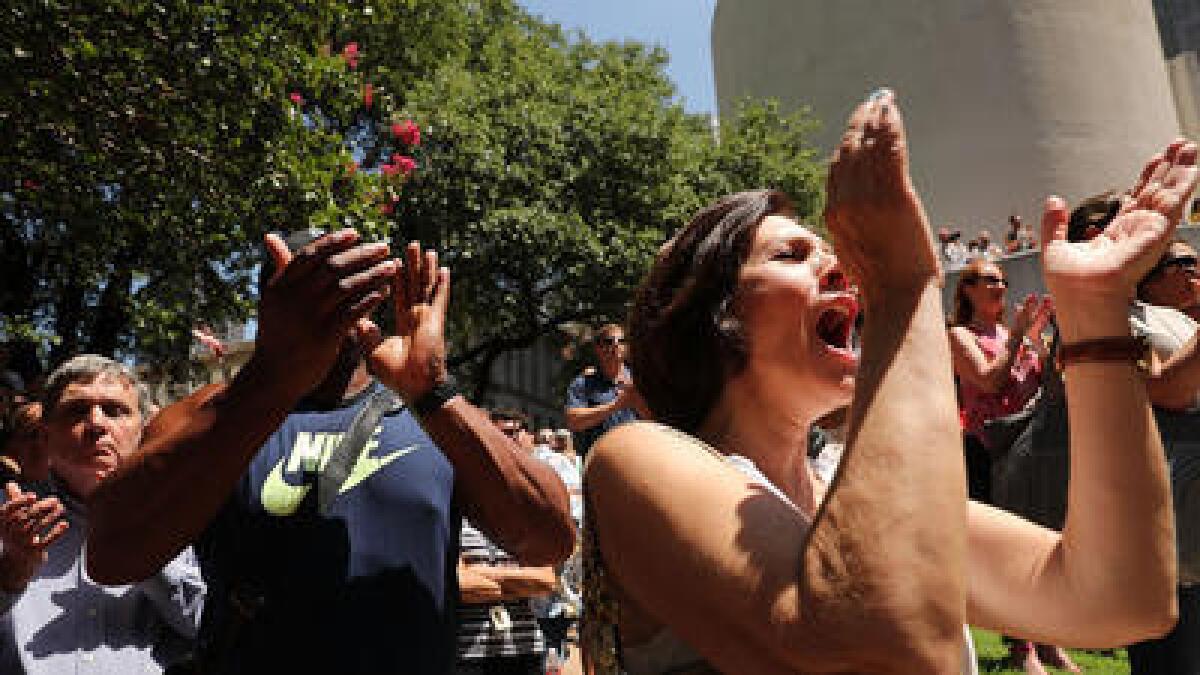
Some civil rights activists and political leaders pivoted away from earlier calls decrying racism and a string of police killings of black men, while others, including President Obama, attempted to speak forcefully on killings by police and of police.
“We mourn the police officers killed ... beside peaceful protesters seeking justice” for Sterling and Castile, NAACP president Cornell Brooks tweeted Friday. The Rev. Jesse Jackson, who had called Sterling’s death a “legal lynching,” described the Dallas killings as a “terrorist attack.”
The Rev. Al Sharpton, who had announced plans to travel to Baton Rouge to meet with Sterling’s family, said Friday that he would be appearing with the mother of Eric Garner on Saturday in Harlem, N.Y., to call for an end to violence against police and nonviolent protests. Garner’s 2014 death after a police officer’s choke hold in Staten Island, N.Y., prompted demonstrations nationwide.
“Police should not be the target. Bad policing should be the target,” Sharpton tweeted.
DeRay McKesson, a Black Lives Matter activist in Baltimore, said he was confident the protesters would keep their resolve.”The people across the movement remain focused on ending violence. The movement has been and will continue to be about ending violence,” said McKesson, who offered his “condolences and prayers” for the dead officers and their families.
Some are comparing the protest climate to that after the death of Garner, who died after he was suspected of illegally selling cigarettes in New York and whose dying words, “I can’t breathe,” became a widespread protest chant.
Demonstrations spread nationally after a grand jury said it would not indict the officer who put Garner in a choke hold. Weeks after the decision, a 28-year-old man shot to death two off-duty police officers in Brooklyn.
The shooting was seen as revenge for the non-indictment and for the death of Michael Brown in Ferguson, Mo. Afterward, New York Police Commissioner William Bratton said the killings were a “”direct spinoff” of protests and New York Mayor Bill DeBlasio called for activists to “suspend demonstrations.”
Dallas gunman was Army reservist who served in Afghanistan
Use of robot in Dallas highlights tactical opportunities, ethical questions for police
The Game, Snoop Dogg lead peaceful march to LAPD headquarters on day of recruit graduation
UPDATES:
4:27 p.m.: This story was updated with more comments from Hillary Clinton.
2:43 p.m.: This story was updated with comments from Hillary Clinton.
This story was originally published at 1:42 p.m.
More to Read
Get the L.A. Times Politics newsletter
Deeply reported insights into legislation, politics and policy from Sacramento, Washington and beyond. In your inbox twice per week.
You may occasionally receive promotional content from the Los Angeles Times.
